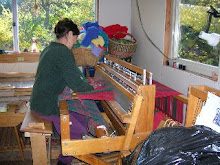

What you see here are two plants that we are growing out for seeds. The Italian parsley is one of several plants of that variety that survived the winter. Italian parsley isn't as hardy as the curly type, all of which came through just fine, so we would like to see if we can increase the hardiness of the strain by selecting those plants which are hardier and saving seed from them. We have pulled out all the curly parsley so that it won't cross with that and we will get the flat leaved kind of parsley.
The lupines are the same. In my garden most of the lupines succumb to mold before they can produce many flowers. so for the last couple of years I've been pulling out all the unhealthy plants and saving seed from the sturdy ones. I'm not getting as nice colors as I did from the original seed strain but they do seem healthier. I'll keep growing the original strains and letting them cross with my survivor lupines in hopes of getting both healthier plants and good color.
Saving your own seed isn't as simple as just letting things go to seed. If you want good plants that do what you expect them to do you have to select the best ones to let go to seed. You can't take seed from the runty ones that you left in the garden because they weren't edible. And you do need to know something about which plants cross pollinate if you want them to come true to seed. We never try to save squash seed because we grown lots of varieties and they will all cross. There's a great book, Breed Your Own Vegetable Varieties by Carol Deppe that goes into great detail on breeding vegetables. Joel relies on it a lot when deciding to grow a seed crop. For dinner tonight we had a head of Giant Caesar lettuce, a variety that was dropped from the seed catalogues a few years ago. It was a great lettuce for us so Joel grew some of his last seed as a seed crop. And this years plants are from our own seed.
So we grow our own seed when we want to improve a variety for our own climate niche, continue to raise a variety that has been dropped from commerce, or just for food security knowing that we can grow food for ourselves and not be entirely dependent on large seed companies.


No comments:
Post a Comment